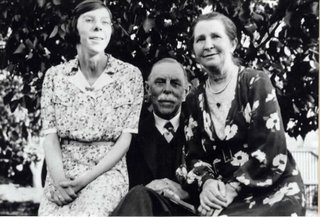
In My Pilgrimage F W Boreham writes at length about one of his daughters, Estelle or Stella.[1]
Gift of a Disabled Child
We saw from the first that as long as she lived, Stella would always have to be coddled and cosseted, the object of constant solicitude, to be watched night and day, treated with unceasing tenderness and guarded from every wind that blows. To make matters worse, our frail little babe sustained, during the first year of her life, a terrible fall, a fall that led to a severe attack of meningitis followed by a long and trying illness. Did any element of rebellion ever enter our wayward hearts? Were there bitter moments in which we wondered why this happened to our treasure- and to us? Did we sometimes compare her with bonnier girls? Do not press me too closely! I can only plead that if we sinned, we have most fervently repented. For the little girl who came to us in Hobart has proved a perennial benediction: every phase of our home life has been sweetened and sanctified by the beautiful ministry of her gentle life.
The Most Shattering Moment in F W Boreham’s Life
If I were asked as to the most nerve-shattering moment that I have ever known, my mind would go back to a certain Sunday morning at Hobart. The service over, I noticed, on emerging from the church, that Stella- then about five- was standing at the manse gate opposite. Catching sight of me, she forgot all about the traffic on the busy street between us, and dashed toward me. As soon as she left the pavement on her side of the road, I saw that nothing could save her. She stepped right into the path of an oncoming car which, striking her on the full, hurled her, a huddled little heap, into the middle of the roadway. With a horror that I cannot attempt to describe, I hurried across to gather her up, only to find that, miraculous as it must seem, she was quite unhurt.
Sweetest Companion
Shy and reserved in the presence of strangers, she has always been to us- and to those who know her- the sweetest and most entertaining of companions: no member of our little circle could bear the thought of life without her.”
Addressing Disabilities
It is interesting to note that with a daughter who had an intellectual disability and he himself having a physical disability (having lost a leg in a tram accident,) F W Boreham regularly wrote in his newspaper editorials about coping with disabilities. Sometimes he would write about blindness and deafness. Sometimes the message was a call to local or national government to provide more services for the disabled while at other times it was an encouragement to see disability in a different light. In 1955 he wrote:
“A handicap is a call for a superb and superlative endeavour. It is at this point that life rises to real grandeur. In his most famous painting, Paul Delaroche, the French artist, represents the heroes of the ages grouped around a central tribunal. But the striking thing about the picture is the fact that all the figures in the foreground are men, who, like Homer, Epictetus, Milton, and a score of others, were horribly afflicted. They had mastered the philosophy of that noble saying of Lord Bacon which every handicapped man should learn by heart: "Whosoever hath anything fixed in his person that doth induce contempt hath thereby a perpetual spur in himself to rescue and deliver himself from scorn.”[2]
Geoff Pound
Image: Photo of Frank and Stella Boreham’s daughter, also known as Stella, along with her father and mother.
[1]F W Boreham, My Pilgrimage (London: The Epworth Press, 1940), 190-1.
[2] F W Boreham, ‘The Base and the Apex’, Hobart Mercury, 17 September, 1955.


